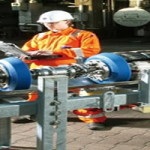Short Brief
A plant objective is to attain the maximum economic benefit and service life from existing equipment without sacrificing integrity. This requires accurate assessment of the condition of the equipment and their suitability for the actual service. Fitness-For-Service (FFS) assessments are quantitative engineering evaluations that are performed to demonstrate the structural integrity of an in-service pressure equipment/component containing a flaw or damage. In June 2007 API and ASME produced a joint update of each society’s version of FITNESS FOR SERVICE. The new standard is now called API 579-1/ASME FFS-1 2007 Fitness-For-Service. It has become the defacto international standard for conducting FFS assessments. The main deliverables from FFS assessments are improved plant integrity and reduced maintenance costs.
The participant in this integrated and comprehensive training will learn to apply the rules of the API/ASME 579 standard “Fitness-for-Service” to evaluate the integrity and remaining life of pressure vessels, storage tanks, piping systems and pipelines, to make cost effective run-repair-replace decisions, and select the appropriate repair options. In this training you will learn:
- Fundamental principles of fitness-for-service, their practical application through case histories, and a step-by-step evaluation process for each type of degradation mechanism
- Basic design of pressure vessels, piping and storage tanks, fundamental principles of component integrity, application of the ASME code rules, material properties of strength and toughness, and the introduction to stress and fracture mechanics
- A review of degradation mechanisms and the application of API/ASME 579 to brittle fracture, general metal loss, local wall thinning, pitting, blisters and laminations, mechanical defects (dents, gouges, misalignment, and distortion), crack-like flaws (stress corrosion cracking, weld flaws, crack-like defects), fatigue, HIC & SOHIC and fire damage
Training Pre-requisite
- This is an intensive and comprehensive training session in which participants are drawn into active participation in discussions and example solutions to enhance learning. Delegates should be familiar with pressurized equipment and piping systems and will probably have a technical degree. Delegates may bring with them a hard copy of API 579-1/ASME FFS-1 2007 (although this is not essential).
Who Should Attend?
This training is intended for technical professionals, supervisors and managers responsible for ensuring the integrity and cost-effective operation of in-service pressure equipment, storage tanks, piping and pipelines throughout their life cycle including design, operation, and maintenance in the petroleum, petrochemical, process and power industries:
- Plant engineers and designers, corrosion and materials engineers, project engineers
- Reliability and integrity supervisors and engineers including safeguarding/MOC engineers
- Inspection engineers and inspectors responsible for monitoring and assessing the condition of pressure equipment and piping systems
- Maintenance and operations supervisors and engineers responsible for shutdown planning and implementation, maintenance and repairs/alterations of pressure vessels, heat exchangers, storage tanks, piping and pipelines
Training Objectives
- Latest techniques to determine the fitness-for-service of operating tanks, vessels, piping systems and pipelines; and make cost-effective run-repair-replace decisions based on the principles of API recommended practice 579 “Fitness-for-Service”
- Balanced approach between the fundamental technical principles of structural integrity, stress and fracture analysis, and their practical application to field conditions
- Provides the participants with the tools necessary to recognize and assess defects in pressure vessels, storage tanks and piping
- Presents and applies the fundamentals rules of the ASME code to operating equipment and systems
- Introduces the participants to the practical application of the ASME and API rules for structural integrity of static equipment and pipelines, and their use to assess remaining life
- Applies API/ASME 579 “Fitness-for-Service” through practical examples to analyze degraded conditions and make cost-effective repair or use-as-is decisions
- Applies the step-by-step 3-level approach of API/ASME 579 to evaluate inspection results and recognize potential failure modes
- Technical basis for reliability-based (risk-based) evaluation of remaining life
- Latest developments in defect assessment techniques, starting with simple rules (level 1) and progressing to the more comprehensive evaluation techniques (level 3)
- Participants will be able to evaluate the structural integrity of corroded or damaged equipment, and assess their remaining life. Degradation mechanisms include: brittle fracture, general metal loss, local wall thinning, pitting, blisters and laminations, mechanical defects (dents, gouges, misalignment, and distortion), crack-like flaws (stress corrosion cracking, weld flaws, crack-like defects), fatigue, and fire damage
Training Coverage
- The training is designed to provide practical knowledge and experience in evaluating the integrity and remaining life of pressure vessels, storage tanks, piping systems and pipelines
- The training will cover basic principles of application of ASME Code rules related to material properties that are important for consideration of stresses and fractures
- The participants will become familiar with the most common mechanisms of material degradation of pressure vessels, recommended inspection procedures as well as with modern NDT methods of assessment of material degradation
- Delegates will be able to apply the knowledge and skills learnt from this training at a practical level in contributing to the Company’s Maintenance Management System
- By following the procedures and rules of API/ASME 579 standard, the delegates will be able to analyze the overall fitness for service of particular components of process equipment and make important decision when considering run-repair-replace options
Training Fee
- Training fee for this 5 day program is 1500 EUR + VAT (18%).
Certification
- Participants shall be awarded with a Certificate of Attendance by Global Alliance Academy upon completion of the whole training program.





